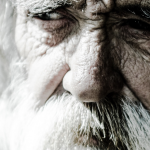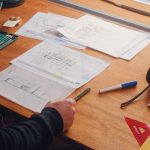Victor wiped the spittle from his mouth after another coughing fit and stared up at the tower. Alabaster white, it rose hundreds of feet in the air, a bastion of antiseptic purity in an ugly and dirty world. He stood in the manicured gardens at its base, the floating silver spheres of the automators keeping it green and healthy despite there being no one to enjoy it.
Through the sealed, shatter-proof glass at the tower’s base, the interior of the ground floor shone with cleanliness: pristine marble, brushed steel, and white plastic.
Victor was keenly aware of the stink of his body, the way his skin itched beneath a layer of dirt he could never seem to wash off, and how his clothing hung on his body in drab, filthy folds. He wanted to walk through the translucent portal in front of him, out of his own decrepit, crumbling world and into the silent purity beyond.
He reached for the door.
“Careful!” a voice said from behind Victor. It was Horace, old and wily. Only he had been brave enough to accompany Victor to the tower. The rest were still afraid of the inside people, though they hadn’t seen one in weeks. “There might be an alarm or something.”
“We need food. There’s none out here, so it must be in there.”
Victor pushed open the door. No electric jolt struck him dead and no alarms sounded. It wasn’t even locked. He stepped into a world forbidden to him his entire life. From his earliest memories there had been the inside people who lived in the towers and the outside people who survived beyond their gates. One group lived a life of ease and isolation. The second group lived off the scraps of the first.
Victor had lived his whole life combing the garbage pits for food, listening to the ceaseless rumbling from the automated factories, and living with the human sounds and stinks of his fellow man. The interior of the tower smelled, shockingly, like nothing, and only their careful footsteps made any noise.
“Where do they live, Victor?” Horace asked and broke into a coughing fit. He hacked up a thick wad of phlegm and spat it onto the white marble floor. Everyone had been sick, much worse than usual. A lot had died, but it had eventually passed.
Victor pointed to the ceiling. “Up.”
The ground floor was smaller than Victor expected, and they found only two doors: a wide silvery one with buttons and a plain one hidden away in an alcove beside it. They couldn’t open the first door; pressing the buttons had no effect. The second, however, opened onto stairs. They climbed three flights before they came to a long hallway with thick white carpet, white tiles on the walls, and more doors, each with a silver number stenciled on its surface.
Victor stopped at a door marked with the number 100. He pushed it open, frowning with surprise that it was unlocked. Beyond was a small metal room. An empty white suit and a clear plastic helmet hung from hooks on one wall. The suit gave Victor pause, as did the slight stink of rot, but they had come too far to turn back.
From the metal room they entered a large square chamber with an alcove in one corner that held shelves piled with plastic boxes and bags. The room was filled with furniture in silver and white: chairs, benches, and sofas made of cushioned leather and cloth. Victor had only ever sat or slept on concrete with little between his flesh and the cold. The urge to experience comfort nearly overwhelmed him. Before he could sit, a soft mechanical noise drew his attention to the other side of the room, to another door standing slightly ajar.
Victor followed the noise and stepped inside a small chamber dominated by an immense bed, upon which lay the corpse of a man in a shapeless white gown. The smell of rot was strong here. A spindly metal machine stood next to the bed, and tubes ran from the machine to the corpse, disappearing under the gown. The machine made the noise Victor had heard. It sounded like breathing.
Victor had never seen an inside person outside of his suit. The man had no hair and no beard, and his skin shone alabaster and unblemished like the great tower he’d lived in. His limbs were thin and spindly, his head bulbous, the eyes too large, the nose too small. The sickness had killed the man. The old, dried vomit on his mouth and the red-brown stain on the bed beneath him told Victor as much. He’d seen many of his own people die the same way.
Looking at the corpse of the inside person, Victor remembered something his mother had told him when he was a child. She’d said for all their towers and machines, the inside people were weak, cut off from the world. She’d said the outside people were stronger because they had to be, because the world made them that way. They endured sickness and starvation and survived; those that didn’t die grew stronger. He’d never believed it. The inside people were gods, untouchable and immortal. But here one lay, covered in his own shit and vomit, slain by the same death that had claimed thousands of Victor’s people but spared many others. He would find nothing but corpses in this tower.
Horace entered the room behind Victor, both hands laden with plastic bags and containers, his mouth full of the food within them. He swallowed and joined Victor next to the bed. “If there’s no one here, can we be the inside people?”
“Go tell everyone to come and help us take the food from this place,” Victor said.
“But why? Can’t we live here?” Horace said, crestfallen.
“No.” Victor drew the sheet over the corpse’s face. “The inside people are dead.”
…
Biography
Aeryn Rudel is a freelance writer from Seattle, Washington. His second novel, Aftershock, was recently published by Privateer Press. Aeryn occasionally offers dubious advice on the subjects of writing and rejection (mostly rejection) on his blog at www.rejectomancy.com or on Twitter @Aeryn_Rudel.
Image: Pixabay.com





